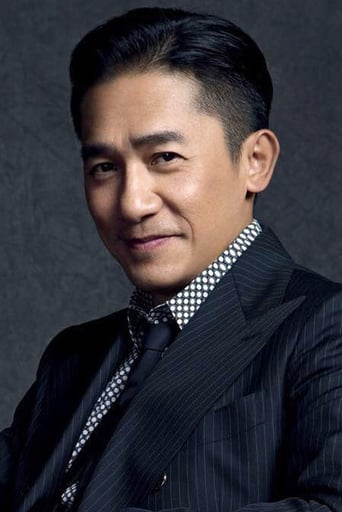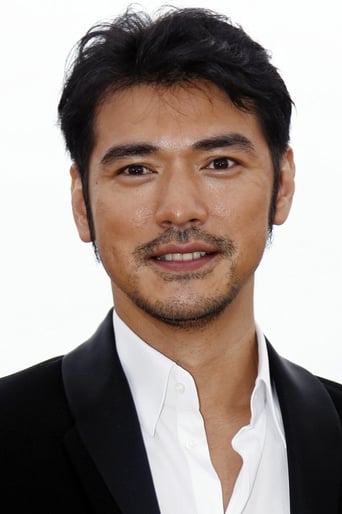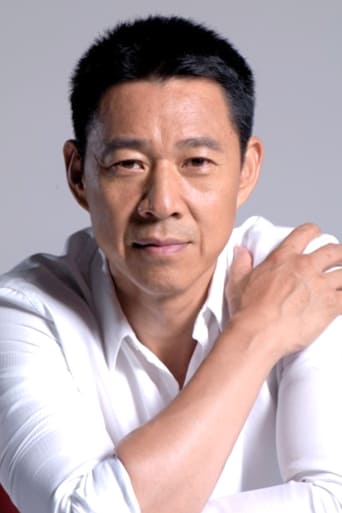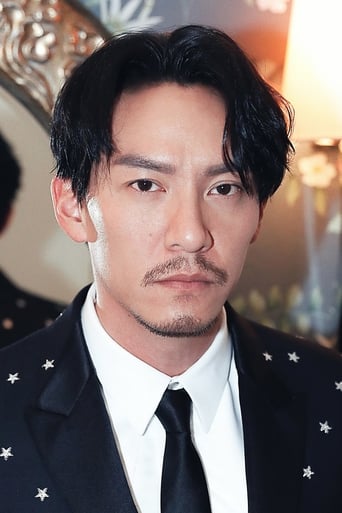Wordiezett
So much average
BoardChiri
Bad Acting and worse Bad Screenplay
Philippa
All of these films share one commonality, that being a kind of emotional center that humanizes a cast of monsters.
Janis
One of the most extraordinary films you will see this year. Take that as you want.
Sean Lamberger
With the cast established, their motivations solidified, the stage set and the first volleys already thrown in the original, John Woo is able to just sit back, relax, and make the thoroughly indulgent epic action picture he always wanted in its sequel. Where the first film thematically leans more in the direction of theology and politics, backed by a brief taste of large-scale military maneuvers, this follow-up is a full-gale blast of battlefield planning and dramatic execution. History buffs may grimace at a few of its flashier moments, like the warrior who uses his spear to pole vault over enemy battalions, but those are rare enough to write off as passing fits of eccentricity from a director who's not always known for his realism. Besides, the real sizzle lies with the world-class, hour long battle scene that closes the picture - and the obscene amount of fascinating war maneuvers seen therein. It's the mother of all fight scenes, an intense, unrelenting thrill ride the likes of which hasn't been seen from the west in decades, if ever. And, as Woo addresses one of my biggest complaints about the first Red Cliff - the generic, evil-for-the-fun-of-it enemy commander who's admirably rounded out in a few powerful scenes - it's ultimately an even better effort than its predecessor. A thrilling, intense, large-scale classic that makes for one hell of a payoff.
imayne
For those who have seen the likes of Braveheart, 300 and Gladiator can go into this movie expecting a Chinese version of all three films. Criticized for bland and scatter-shot characterization by many while screening in Asia, I for one loved it.This is an ancient story known to most children in the Far East: in the Three Kingdoms period, numerous warlords partition China and the eventual result boils down to three major ones: Liu Bei, Sun Quan and Cao Cao, who was also the Prime Minister, and de facto ruler of the country. When Cao Cao was on the verge of conquering all of China, a joint force of Liu Bei and Sun Quan engaged him in a naval battle at Red Cliff and defeated him by burning his entire fleet with the aid of the wind.So famous, and so quoted is this story in the Far East, that one would be surprised that this film adaptation is nothing but formulaic. It is almost a twist, a turnabout, on the formula of the "Big Man History" format that has dogged Hollywood epics, the whole idea that one man can inspire thousands to affect a series of triumphs. In this movie, that is entirely changed. Like Milton in "Paradise Lost", this film seems to be "of the devil's party", and it may jolly well know it, even if slyly.The Devil here refers to the villain of the piece, Cao Cao, who also happens to be the most well-drawn character in the movie. Historically known as one of the wisest and most beneficent rulers of the day, his Machiavellian hardball politics at odds with China's Confucian orthodoxy ("holding the Emperor hostage, commanding the nobles.") have however tarnished his reputation among Confucian scholars, and here both sides of his nature are acknowledged. Power-hungry, passionate and cunning, but not without a sense of humor. This is a man who composes classic poems as he leads his troops into battle, laughs as he sends diseased corpses into enemy camps as germ warfare, and kills anyone that he so much as suspects of disloyalty. As the movie proceeds on through a series of maneuvers and counter-maneuvers by both sides, what falls Cao Cao and results in his eventual defeat (an ending known to most children in the Pacific Rim) is precisely that monstrous ego. He commands front and centre among his troops to the extent that all those around him never get a chance to shine. His monstrous ego and overwhelming power cause him to ignore or steamroll over good advice, and is key to his downfall, down to very last decisive second. In spite of his intelligence and charisma, because no one enforces checks on his power, no one is there to correct his mistakes.Far from the case in the armies of Liu Bei or Sun Quan, Cao Cao's rivals. Within their groups, there is a division of labor, and both Sun Quan and Liu Bei are intelligent, charismatic but not egotistical. In such a situation power is at least checked within the group and tempered by a sense of mutual respect and honor, in contrast to the unwavering loyalty and obedience that Cao Cao demands of his troops. Loyalty towards the group in this case is not co-existing with loyalty to the leader. It is this mutual respect and this ability to pool good ideas and listen to good advice, that ultimate leads Sun Quan and Liu Bei to victory.What do you know! Chinese cinema has just produced in the form of a historical epic, an impassioned allegory for the advantages of democracy. This movie is at the same time a great showing-up of the oddly undemocratic nature of the Hollywood historical epic, with its "Big Man"-centred heroic narratives.This may be John Woo's cleverest and most understatedly subversive film yet.
KineticSeoul
The first half of this film was at least amusing but it starts to fall apart from there. This film is more cartoonish than the first movie and not realistic at all, a lot of parts in the movie never really happened in Chinese history. From what I heard the final battle scene of this movie wasn't even fought by the people who are portrayed in the movie, I assume John Woo went this direction cause he only spent time developing only a handful of characters and to top it off the movie ends with a wimper. The first movie at least had some good battle scenes, but part 2 really lacks the battle scenes compared to part 1 and I thought part 1 lacked action as well. John Woo just added a lot of drama without actually adding anything to the brutality of war. The final stand off in the movie was absurd and not believable and it's not just cause it didn't happen in Chinese history that way even though I don't know the Chinese historical context I know a lot of the parts portrayed in the movie to be false. Even when John Woo tries to add character development to some of the other characters like Sun Shangxiang he was doing more damage than good, cause it wasn't captivating what so ever. I don't even want to get into the bad dialogue cause it well pretty bad. I will give this movie a 7 cause at least the first half of the movie was more captivating than part 1 although the battle cause it was ridiculous and not very engaging the ending was a let down as well.7/10
Li Pan
First of all, the cinematic in both Chi Bi I and II are amazing. Colors and sceneries are stunning. Battle scenes from the ships burning to blood spilling off of the cold steel of Zhao Yun's lance are unprecedented in Chinese films. Also, the computer graphics in the movie is a big step up from Chen Kaige's Wu Ji (The Promise 2005).Other than the visual component of the movie, everything else is unfortunately a failure. I have been been anticipating the movies since late 2007. There had been a trend of Chinese movies trying to mimic Hollywood and impress westerners. I was hoping that Chi Bi would turn out to be an eastern epic of its own since it is based on one of the greatest battles within 4500 years of Chinese history. Yet after being very unsatisfied with the first movie, Chi Bi II: Jue Zhan Tian Xia was even more disappointing. Here are 4 reasons why it was a failure:1)Characters: Other than Zhuge and Zhou Yu who were depicted in details, most other characters were very one-dimensional. For example, Cao Cao was portrayed as an arrogant, ambitious, and brutal man who makes his own decisions. In the movie, he became the all powerful villain that everyone feared. However, Cao Cao in the story was supposed to be very intelligent, benevolent at times and Charismatic, with many brilliant advisors he often took suggestions from. Not only did Cao Cao give me the impression of Xerxes in 300, it erased other sides of his personalities which made him interesting. Furthermore, John Woo failed to portray Liu Bei as a powerful man who would rise to be the ruler of one of the three kingdoms. In Chi Bi II, he delivered the impression of man who feared death who even had trouble inspiring his own men.2)Hasty Modification of the Plot: In order to fit most of the key events leading up to the battle within a series of two films, many events were simplified or re-written. For example, Pang Tong - one of the most intelligent characters in the original book was cut out from movie. Instead of his phony surrender to Cao Cao and proposing the method of linking the ships together, it was simplified to a short dialog between Admiral Cai informing Cao Cao of his decision to link the ships. Also, Zhou Yu punishing his general Huang Gai with one hundred back lashes to deceive Cao Cao for the reason of Huang Gai's surrender was modified into Xiao Qiao's (Zhou Yu's Wife) decision of seducing Cao Cao to stall time. Furthermore, themes with Zhuge "borrowing the wind", Cao Cao's escape in Hua Rong Dao were reduced to a prolonged battle scene. With so many events holding great significance which contributes to the ultimate miracle at Chi Bi cut out, the plot of the movie became very predictable, unimpressive, and even confusing.3)Very One Sided, Zhou Yu in Super Hero Mode: Zhou Yu was supposed to be the mastermind commander behind Sun Quan's army, but with average ability to combat. Yet, in the movie, Zhou Yu was chopping away in tens and thousands of soldiers like Achilles to save his wife. In fact, it was more like a gang of super heroes (Liu, Guan, Zhang, Zhao, Sun)unstoppable against Cao Cao's army. Ironically, none of them actually fought at Chi Bi, it was fought by their generals who were never mentioned. In the original story, Cao Cao also brought with him his best generals (Xiahou Yuan, Zhang Liao, Xu Chu, Xu Huang, Zhang He...etc) who were intelligent and were extremely skilled warriors. Neither were they mentioned. It made the battle seem less dramatic because Cao Cao's men were almost like obsoletes. Cao Cao's generals were portrayed as clueless cowards who hid behind the fences.4) Misleading Scenes and Redundancy: John Woo put his main focus on the characters of Zhou and Zhuge portraying their friendship and intelligence, which totally missed the point of the intricacy of their alliance. Zhou was constantly jealous of Zhuge's intelligence, and was trying to find every reason to kill him. In fear that Zhou Yu would prevent Liu Bei from becoming a power, Zhuge was also working to protect his master Liu. John Woo's attempt to expand on Zhuge's character with the scene of him delivering a baby horse in the first movie was totally unnecessary, in fact it was absurd. As if there is no one else who knew how to deliver baby horses within the entire army.Chi Bi Zhi Zhan (Battle of Chi Bi) was between Cao Cao's army of close to one million against 50,000 combined forces of Liu and Sun. The victory was supposed to be a miracle. It was the combination of strategies, weather, geography, from intricate planning. Yet John Woo made it a two men show of Zhuge and Zhou. The over simplification was ultimately resulted in disappointment. It leaves the wrong impression on those who does not know about the story. Overall, Chi Bi had good material to work with, but ended in failure.





